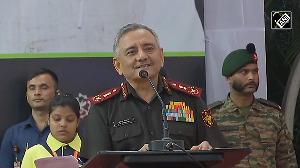The verdict of the 2009 general election has once again brought the 'centre' in Indian politics to centre-stage. India has returned to an even keel.
I learnt the ABC of Indian politics from a Communist ideologue called Mohit Sen in his Narayanaguda flat in Hyderabad in the early 1970s. The one thing he kept drilling into my teenage mind all the time was the idea that India can only be ruled from the 'political centre.' That is how he justified the Communist Party of India's support to Indira Gandhi and that is why he was finally excommunicated by the Communists.
Analysing Indian policies and politics over the past two decades, watching these being shaped in the Prime Minister's Office for over four years, and writing speeches for the prime minister, I often recalled Mohit Sen's wise words. India can not be governed either from the 'right' or the 'left'. India can only be governed from the 'centre'.
Individual states could lurch in one direction and remain there for long periods of time, like West Bengal on the left and Gujarat on the right. But this sub-continental, civilisational republic can only be governed from the political 'centre'.
That political centre has been empowered once again by the results of the 2009 general election.
The Indian National Congress always occupied the political centre. It may have lurched to the left at times and to the right at times, but its destiny was in the centre because it emerged as the consensual voice of a plural nation. All those political scientists who theorised about the so-called 'era of coalitions' in the post-Emergency period forgot that the Congress party was always a coalition. Its success is defined by remaining so.
The Congress entered the 2004 campaign on a weak wicket because Atal Bihari Vajpayee had tried, fairly successfully, to usurp that centre space from the Congress. I was pilloried by many in the Congress and on the left for writing an editorial entitled 'Atal Bihari Nehru.' But that precisely was Vajpayee's project, and that is why he became the first non-Congress prime minister to serve a full term in office.
Because the BJP grabbed a bit of that centre space, the Congress was forced to turn left to regain ground. The problem with the 2004 verdict was that the Left Front, and some in the Congress, actually interpreted the result to mean India had moved left.
The Left's '60' in 2004 came from a pro-Achutanandan wave in Kerala, after he was initially denied a ticket by the party bosses in Delhi, and a pro-Buddhadev wave in Bengal. Recall those T-shirts Thiruvanantpuram's teenagers wore with 'VS' emblazoned on them?
The ideologues of the left however interpreted this 'regional' result as an endorsement of their political platform, and tried to impose this on the Congress through the National Common Minimum Programme. Many in the Congress happily walked into this trap because they were so dazed by the result and were so happy to return to government after almost a decade.
In a classic Communist party manoeuvre Prakash Karat took charge of the Communist Party of India-Marxist by staging a virtual coup at the Party Congress in 2005 and tried to push the entire United Progressive Alliance leftwards. He tried to put the Congress on the defensive by charging it of abandoning the nationalist platform on foreign policy.
The Left painted Manmohan Singh as a 'neo-liberal' economist, knowing full well that he was and has always been a 'Keynesian' liberal, and charged him of a pro-US bias.
Some in the Congress, like Mani Shankar Aiyar, seemed to fall into this trap and echoed the Left view that the 2004 verdict was in favour of pro-left policies. This created an ideological confusion within the Congress that the Left exploited by seeking to drive a wedge between the party and the government. The India-US civil nuclear cooperation agreement was used as an instrument to stage that coup.
In the meanwhile, the BJP dumped Vajpayee's centrism and moved right without reflecting on why Vajpayee had tried to take the party away from its core ideology. Vajpayee was trying to 'Congressise' the BJP. Once the BJP abandoned that project under the leadership of Lal Kishen Advani and Narendra Modi it lost 'middle India'.
So what contributed to the revival of the Congress? I believe it was the Congress' decision to strike out on its own, unencumbered by the ideological prejudices of the Left and the caste-based and regional parties. The Congress re-asserted its independent centrist identity. It remembered that it was in fact the original political coalition in India.
Early in the election campaign Prime Minister Manmohan Singh hit out at casteism and regionalism and identified these as equally damaging as communalism to the future of our Republic. Further, by rejecting the Third Front's attempts to give the Congress a character certificate on nationalism, the Congress regained the centre space that they were trying to take away.
The Left's stance on the India-US nuclear deal was motivated by a Bolshevik instinct to hijack the Congress agenda. By guilt tripping the Congress and accusing the prime minister of abandoning 'an independent foreign policy' they were hoping to shape Indian foreign policy in the manner they sought to shape economic policy in the past.
If the Congress had gone along with the Left and dumped the nuclear deal it would have once again surrendered 'its' political space to the Left.
Wisdom lay in asserting its own independence and, above all, in reclaiming the centre space of Indian political life for itself. That is precisely what the Congress did in 2009.
Returning to the ideological centre, enabled the Congress to return to the Centre.
Sanjaya Baru served as media advisor to Prime Minister Manmohan Singh, from 2004 to 2008.





